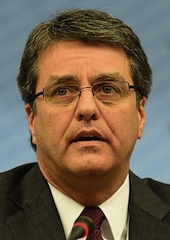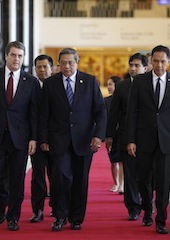What’s Next for the WTO?
To reform the WTO, the director-general can take a cue from his home nation, Brazil.
December 16, 2013

Roberto Azevêdo, the new WTO head, has earned praise for avoiding the implosion that has characterized many past WTO meetings and instead securing a deal. However, the real question is what lesson the new Director General should draw from his intense first few months of WTO leadership.
The Bali deal indicates that, while attempts to expand the scope and jurisdiction of the WTO do not enjoy support from most member countries, Azevêdo may find more support in heeding longstanding calls to alter existing WTO rules.
If Azevêdo is to take this lesson to heart and chart a new direction for the world’s most powerful commerce organization, he can take a cue from his home country. Brazil has proven successful in challenging old globalization agendas and crafting its own trade policy.
Brazil stands out because it was one of the few countries that wisely refused to subject its financial services sector to the WTO’s broad deregulation requirements. Unlike those countries that did, Brazil weathered the 2007/8 global financial crisis with limited impact.
Another example of Brazil’s savvy is its refusal to accept an obscure-sounding provision that is usually buried in the trade and investment agreements and pushed onto other countries by the United States and the EU.
Known as “investor-state” dispute resolution (ISDR), this mechanism empowers foreign corporations to bypass the domestic legal systems of the countries in which they operate.
Instead, it allows them to drag sovereign host governments before extrajudicial tribunals with a stunning demand — compensate corporations for health or environmental policies (or other government actions) that the investors find inconvenient.
These tribunals are comprised of three private sector attorneys, unaccountable to any electorate. And yet, they are empowered to decide whether an important public interest policy should be deemed a violation of expansive, but vaguely-worded foreign investor privileges.
For example, a Peruvian anti-toxics policy is now being attacked by a U.S. corporation, as is Canada’s medicine patent policy. And U.S. tobacco behemoth Philip Morris has launched cases against progressive anti-smoking laws in Uruguay and Australia, after failing to undermine the health laws in domestic courts.
To outsiders, this may sound like a conspiracy theory. If only. In the name of investment promotion, U.S. trade negotiators over the past two decades have quietly inserted these far-reaching provisions into a panoply of “free trade” agreements (FTAs) signed with 17 mainly developing countries, from Mexico and Chile to Oman and Morocco.
A wave of cases
European countries have inked nearly 1,000 Bilateral Investment Treaties (BITs) that contain the same mechanism with developing countries in Latin America, Africa and Asia.
As a result, U.S. and EU oil, pharmaceutical and other corporations are now launching an unprecedented wave of these investor-state cases. The U.N. reports that the cumulative number of investor-state cases has jumped tenfold since 2000.
Corporations are using this tool to go up against consumer safeguards, environmental laws, financial regulations and other polices that they claim inhibit their “expected future profits.” These tribunals have already ordered governments to pay billions to foreign corporations, while billions more in claims remain pending.
Given that, why would any country want to sign on to such a one-sided system? Most likely, it is a case of deceptive advertising.
Sweeping investor privileges, it was reasoned, were required to attract a steady flow of investment into developing countries. Investor-state clauses were originally presented as promoting investments. In reality, they have turned into a Trojan horse.
Brazil vs. Peru
If the agreements had worked as advertised, Brazil — which has steadfastly refused to accede to these tribunals — should be hurting for investment after rebuffing BITs and U.S. FTAs that enshrine the ISDR system. And Peru, having ratified nearly two-dozen such treaties and signed onto an ISDR-embodying FTA with the United States, should be a darling of foreign investors.
The reality is the opposite. The U.N. reports that in 2012 Brazil was the world’s fourth most popular destination for foreign investment, only outdone by the United States, Hong Kong and China.
While Brazil easily clinched Latin America’s top spot as a foreign investment magnet, Peru ranked as one of the region’s lowest foreign investment recipients. Indeed, study after study has found zero correlation between a country’s submission of its public policies to the whims of investor-state tribunals and its ability to attract foreign investment.
Other countries following Brazil’s lead
No wonder then that South Africa is in the process of terminating its BITs with investor-state enforcement, as is Ecuador. Countries such as Bolivia and Venezuela have withdrawn from the World Bank forum where most investor-state cases are tried
The opposition to these dubious tribunals has also reached the Global North. After a multi-year review under the past conservative government, Australia concluded that the investor-state regime was not in its national interest.
It refuses to be subjected to the U.S.-proposed expansion of the investor-state system through the Trans-Pacific Partnership, a sweeping FTA currently under negotiation.
Given Brazil’s proven success in refusing such costly schemes and engaging in the global economy on more pragmatic terms, will Roberto Azevêdo take a cue from his home country, learn from the recent backpedalling in the Bali deal to bring a new perspective to the WTO? The odds may be long, but the world can only hope so.
Takeaways
What lesson should the new Director General draw from his intense first few months of WTO leadership?
Attempts to expand the scope and jurisdiction of the WTO do not enjoy support from most member countries.
Brazil has proven successful in challenging old globalization agendas and crafting its own trade policy.
“Investor-state” dispute resolution empowers MNCs to bypass domestic legal systems of countries in which they operate.
Brazil refuses to accept ISDR tribunals in trade deals. Yet it is the 4th most popular place for foreign investment.
There is no correlation between submission to the whims of investor-state tribunals and rate of foreign investment.
Opposition to investor tribunals has reached the Global North. Australia found ISDR was not in its national interest.
Azevêdo should take a cue from Brazil’s success in rejecting bad schemes and meeting global trade pragmatically.
Read previous

Small Business and the WTO
December 16, 2013

